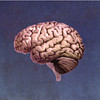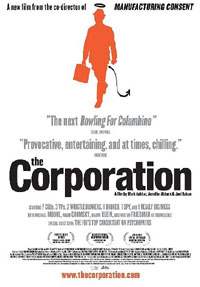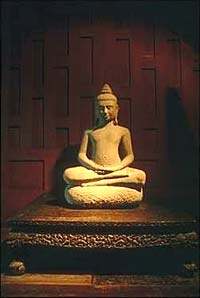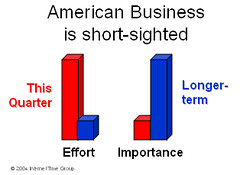Wednesday, June 29, 2005
Life in the Corporation

The human brain is a trickster. It has to be. If it weren't rejecting 99.99% of the input bombarding our senses, our heads would explode from sensory overload.
Our brains convince us that what we see is real, while it's actually an illusion our consciousness makes by connecting the dots.
Neuroscientists reported last week that fMRI tests explained what social psychologist Solomon Asch had discovered fifty years ago . Here's The New York Times' description of Asch's experiments:
In those early studies, the subjects were shown two cards. On the first was a vertical line. On the second were three lines, one of them the same length as that on the first card.
Then the subjects were asked to say which two lines were alike, something that most 5-year-olds could answer correctly.
But Dr. Asch added a twist. Seven other people, in cahoots with the researchers, also examined the lines and gave their answers before the subjects did. And sometimes these confederates intentionally gave the wrong answer.
Dr. Asch was astonished at what happened next. After thinking hard, three out of four subjects agreed with the incorrect answers given by the confederates at least once. And one in four conformed 50 percent of the time.
The fMRI studies showed that people sometimes saw what other people described rather than what was on the cards. They weren't consciously thinking about disagreeing with the group; they reported what they saw.
As the comedian said, "I used to think the brain was the most important organ in the body, and then I thought, 'Hold on. Who's telling me that?'" Indeed, our consciousness tells us we're in control, even when we're clearly not. Back into the fMRI. Say I decide to move my right hand. The brain scanner shows that my hand started to move before I ever thought about it. My "decision" is really an excuse to fool me into thinking I had some choice in this. Often our control over our actions is make-believe.

It's au courant to compare organizations to living organisms. Both are born, grow, flourish, wither, and die. Both consume resources and excrete waste. Both think they are controlled from the top. Both think their actions create future results. Both think they are logical.
What if corporations are as misguided as we humans?
Corporations are no more top-down than humans; the shadow organization alwyas overpowers the organization chart.
What if corporations that think they are empowering workers are simply going along with the trend toward increasing worker freedom?
Are good business results the result of good work or are they happenstance?
Is the frenzied pace of business a needless exercise? Are we putting people through the wringer when we could be putting them on the beach? Shouldn't we be working more wisely instead of ever harder?
 When people get burned out or lose their way or go postal, we prescribe some rest, meditation, a session with a therapist, diversions, drugs, a good sleep, a new way of looking at the world, or maybe shock treatment.
When people get burned out or lose their way or go postal, we prescribe some rest, meditation, a session with a therapist, diversions, drugs, a good sleep, a new way of looking at the world, or maybe shock treatment.Corporations don't do these things. Humans go into fight or flight mode. Corporations do the same, but their power makes them harder to restrain than individuals.
When will corporate investors wake up to the fact that the unexamined life is not worth living?

